Types of Fruit Seeds: From Garden to Kitchen
Published: 30 Nov 2025
Welcome, fruit lovers!
Did you know there are different types of fruit seeds? Fruit seeds are nature’s tiny powerhouses, capable of growing into fruitful plants. Fruit seeds vary in size and form, with unique growth patterns and uses.
Sheila, a botanist with a master’s degree and over seven years of research experience, guides you through essential classifications, benefits, and culinary uses for various fruits. This article offers insights perfect for everyone, from beginners to experienced gardeners.
By the end, you’ll understand how different fruit types impact your health and pick practical tips for adding them to your diet. Let’s start this flavorful journey and explore the world of fruits.
Types of Fruit Seeds
We classify fruit seeds to identify edible and toxic types, guide proper planting, and understand their growth needs. This classification also facilitates seed storage and propagation, supporting biodiversity and eco-friendly agriculture.
Here are the main types of fruit seeds based on
A fruit is a plant’s way of making sure its seeds get to the next generation.Michael Pollan
- Edibility: Whether the seeds are safe to eat or not.
- Size: The size of the seeds, from small to large.
- Growth: The time and conditions required for the seeds to grow.
Fruit Seed Types Based on Edibility
Fruit seeds are divided into two categories based on edibility:
- Edible Fruit Seeds
- Non-edible Fruit Seeds
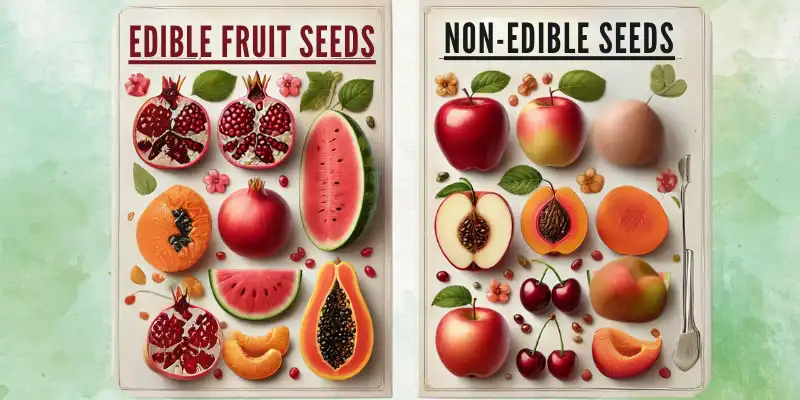
Edible Fruit Seeds:
Edible seeds, such as those found in pomegranates, watermelons, and papayas, are safe to eat and often packed with essential nutrients. They add texture and flavor to dishes while offering health benefits. For example:
- Pomegranate Seeds: These tiny, juicy seeds are enjoyable to eat and rich in vitamins.
- Watermelon Seeds: When roasted, they make a tasty and healthy snack.
- Papaya seeds: These nutrient-rich seeds have a strong, peppery flavor.
Non-edible Fruit Seeds:
Non-edible seeds, such as those from apples, cherries, and peaches, can be harmful if consumed in large quantities due to toxins like amygdalin. It’s important to know which seeds are safe before adding them to your diet. For example:
- Apple seeds contain amygdalin, which can be toxic in large amounts.
- Cherry seeds, like apple seeds, also have amygdalin.
- Peach seeds are challenging and should not be eaten.
Variety of Fruit Seeds Based on Size
Based on size, we can separate fruit seeds into two categories:
- Long Seeds
- Small seeds
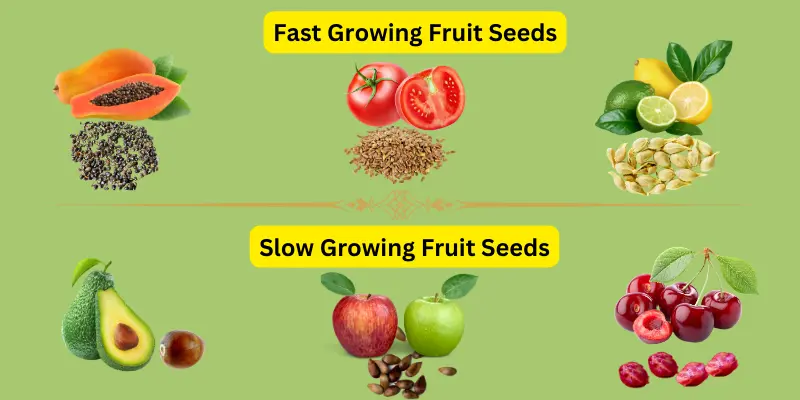
Size impacts planting methods and edibility.
Long Seeds
Some fruits have seeds so big you can’t miss them. It’s like ignoring a big rock in the middle of a road. Here are some fruits with large seeds:
- Avocado: The seed is as big as a golf ball!
- Mango: The seed inside a mango is flat and large.
- Peach: It has a complex, stone-like seed in the center.
Small Seeds
Other fruits have seeds so tiny that you might not even notice them. They are like tiny sprinkles hidden inside the fruit. Here are some examples:
- Kiwi: These fruits have tiny, crunchy black seeds.
- Strawberry: The seeds are located on the outside and appear as tiny dots.
- Dragon Fruit: Its seeds are small and scattered throughout the flesh.

Various Fruit Seed Types Based on Growth
There are mainly two fruit seed types based on growth:
- Fast-growing Seeds
- Slow-growing Seeds
Fast-Growing Seeds:
Some fruit seeds germinate quickly, like popcorn pops fast when heated. These seeds are great for people who love quick results:
- Lemon seeds: They sprout quickly and are perfect for impatient gardeners.”
- Papaya seeds: They grow into small plants rapidly.
- Tomato seeds: They germinate fast and are easy to grow.
Slow-Growing Seeds:
Other seeds take their time to grow. It’s like watching a turtle walk slowly but steadily. These seeds need patience:
- Avocado Seeds: They can take up to six weeks to germinate.
- Apple Seeds: They need to be chilled before they can sprout.
- Cherry Seeds: They also require cold treatment before they start growing.
How to Choose the Right Fruit Seeds
Choosing the right fruit seeds is like selecting the right piece to complete a puzzle. You need to consider where and what you want to grow. If you’re looking for something quick, choose fast-growing seeds. If you’re looking for a challenge, consider slow-growing seeds.
A fruit is a thought in the heart of a flower.Christopher Morley
For Home Gardens
If you have a small garden or even just a pot on your balcony, go for seeds like
- Tomatoes: They don’t need much space and grow quickly.
- Strawberries: They can be grown in pots and taste sweet.
For Larger Gardens
If you have a big garden, you can try growing fruit trees:
- Mango: It needs space but gives you sweet, juicy fruits.
- Avocado: It takes time to grow, but it is worth the wait.
Health Benefits of Fruit Seeds
An apple a day keeps the doctor away. Proverb
Fruit seeds aren’t just for growing new plants; they’re packed with nutrients and health benefits. Discover how these tiny powerhouses can boost your diet and overall well-being. Let’s explore together!
| Fruit Seed Type | Health Benefits |
|---|---|
| Pomegranate Seeds: Antioxidant Powerhouse | Pomegranate seeds, rich in antioxidants like punicalagin and anthocyanins, support heart health, reduce inflammation, and aid digestion. Their benefits and vibrant flavor enrich my diet and research. |
| Watermelon Seeds: Protein-Packed Snack | I roast watermelon seeds, which are packed with protein, magnesium, and healthy fats, and enjoy them as a nutritious snack to support my wellness journey. |
| Pumpkin Seeds: Nutrient-Dense Boost | Pumpkin seeds, rich in magnesium, zinc, and antioxidants, boost heart and prostate health. I recommend them to clients for energy and supporting the immune system. |
| Grape Seeds: Skin Health Supporter | Grape seeds, rich in proanthocyanidins, boost skin elasticity and circulation. I’ve experienced improved skin health and reduced signs of aging using grape seed extract. |
| Interesting Facts |
|---|
|
Final Thoughts on Fruit Seeds
Fruit seeds are unique little things. They come in all shapes and sizes, fitting into various types of fruit seeds. Some types grow rapidly, while others develop at a slower pace. Some are edible, and others are not. But each type holds the promise of new life, just like how a tiny seed can grow into a big, strong tree.
If you’re curious about growing plants from seeds, start with easy seeds like tomatoes or lemons. Watch them grow; soon, you’ll have your fruit plants!
Happy gardening!
FAQs
Check out these frequently asked questions to learn more about the types of fruit seeds.
Fruit seeds can be classified by edibility (edible or non-edible), size (large or small), and growth rate (fast or slow).
No, not all fruit seeds are edible. Some, like apple and cherry seeds, contain toxins, while others, like pomegranate and watermelon seeds, are safe and nutritious.
Many fruit seeds can be dried and saved in a cool, dry place for later planting. However, some seeds, like those from tropical fruits, may lose viability quickly and require immediate planting or special care.
You can identify seed types based on fruit categories: stone fruits have hard pits, aggregate fruits like strawberries have seeds on the outside, and citrus fruits have small, segmented seeds. Observing size, shape, and texture helps, too.
True seeds contain an embryo that can grow into a new plant, while seedless fruits are usually the result of selective breeding or genetic variations that prevent seed formation. Examples include seedless grapes and bananas.
Each type of fruit seed has specific germination requirements. Some, like citrus seeds, require moist soil and warmth, while others, such as apple seeds, need cold stratification.
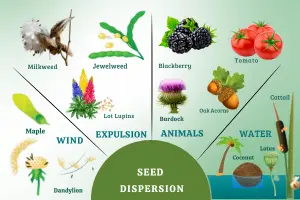
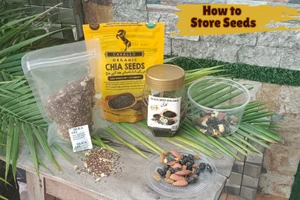
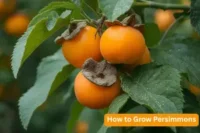
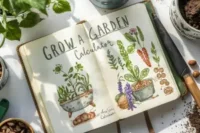


I have seeds, sent in the mail that did not have the name of the seeds, nor did the come with planting instructions. Could you identify them and give me instructions to plant them?
It would work best for me if you could call or text me.
Lawrence Bachmeier
612-269-8856
Thank you for reaching out! I'd be happy to help you identify and plant the seeds you received.
Could you please email a clear photo of the seeds to info@seedguides.com? Once I receive the image, I’ll do my best to identify them and provide easy step-by-step planting instructions.
For privacy and safety reasons, I won’t be able to call or text, but I’ll respond to your email promptly.
Looking forward to assisting you!
Warm regards,
Sheila
Botanist, SeedGuides.com